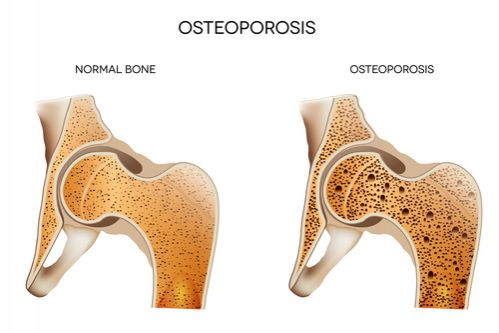Magnesium is a vital mineral that supports numerous functions within the body, such as maintaining healthy bones, nerves, muscles, and energy levels. Despite its importance, many people, especially in the U.S., do not get enough magnesium from their diet. According to the National Institutes of Health, teenage girls and men over 70 are particularly prone to magnesium deficiency. However, anyone can experience a lack of magnesium, leading to various symptoms. Below are 12 signs that you may need more magnesium and what you should do next.

Photographee / Shutterstock
1. Low Energy
Magnesium is involved in over 300 biochemical reactions in the body, many of which are essential for energy production. If you frequently feel fatigued or struggle with low energy levels, it might be due to a magnesium deficiency. Functional medicine experts often point out that when magnesium levels are low, energy production can suffer.
What You Should Do: Increase your intake of magnesium-rich foods like leafy greens, nuts, and seeds to help boost your energy naturally.
2. Muscle Twitches or Cramps
Magnesium plays a crucial role in muscle relaxation. When your body lacks magnesium, it can result in involuntary muscle contractions, twitching, or cramps. This occurs because without enough magnesium, muscles cannot relax properly, leading to prolonged contractions.
What You Should Do: Incorporating foods high in magnesium such as bananas, spinach, and almonds can help prevent these uncomfortable symptoms.
3. Frequent Headaches or Migraines
Magnesium deficiency has been linked to frequent headaches, particularly migraines. Low magnesium levels can cause blood vessels in the brain to constrict, which may lead to headache pain. Studies suggest that around 50% of migraine sufferers could have low magnesium levels.
What You Should Do: Consider increasing your intake of magnesium or speaking with your doctor about magnesium supplements, especially if you suffer from regular headaches or migraines.
4. Insomnia and Sleep Problems
Having trouble falling asleep or staying asleep can be a sign of magnesium deficiency. Magnesium helps regulate sleep by calming the nervous system and reducing stress. When magnesium levels are low, it becomes harder for the body to relax, making it difficult to achieve restful sleep.
What You Should Do: Incorporate magnesium-rich foods into your evening meals, such as whole grains and legumes, or consider magnesium supplements to improve sleep quality.
5. Irregular Heartbeat
Low magnesium levels can affect the heart’s electrical signals, leading to irregular heartbeats or palpitations. Doctors often prescribe magnesium supplements to patients who experience arrhythmia or other heart rhythm problems.
What You Should Do: If you notice an irregular heartbeat, consult a healthcare professional. They may recommend magnesium supplementation to help regulate your heart rhythm.
6. Increased Sensitivity to Noise

Magnesium helps stabilize the nervous system. When levels are low, the nervous system can become overly responsive, leading to increased sensitivity to noise or a heightened startle reflex.
What You Should Do: Ensuring a balanced diet with magnesium can help reduce this hypersensitivity, allowing the nervous system to function more normally.
7. Seizures
Severe magnesium deficiency can disrupt the normal functioning of the nervous system, leading to seizures. Although rare, this is a serious symptom that requires immediate medical attention.
What You Should Do: If you experience seizures, seek medical advice as this could be a sign of severe magnesium deficiency or another underlying health issue.
8. Low Bone Density

Magnesium plays a significant role in maintaining bone health. Low levels of magnesium can lead to decreased bone density, increasing the risk of fractures and osteoporosis. Magnesium helps regulate calcium levels, which is critical for strong bones.
What You Should Do: To support bone health, consume magnesium-rich foods like avocados, dairy products, and dark chocolate, and consider discussing magnesium supplementation with your doctor.
9. Constipation
Magnesium acts as a natural muscle relaxant, including in the digestive tract. When magnesium levels are low, bowel movements can slow down, leading to constipation. Magnesium is also the primary ingredient in many over-the-counter laxatives.
What You Should Do: Increase your water intake and eat more fiber-rich foods like leafy greens, which are also high in magnesium, to help regulate bowel movements.
10. High Blood Pressure

Magnesium helps maintain normal blood pressure by relaxing blood vessels. A deficiency in magnesium can lead to increased blood pressure, which raises the risk of heart disease.
What You Should Do: Adding more magnesium to your diet can help regulate blood pressure. Foods like leafy greens, whole grains, and fish are excellent sources of magnesium.
11. Type 2 Diabetes
Magnesium plays a key role in insulin regulation and glucose control. People with low magnesium levels are at a higher risk of developing type 2 diabetes. Adequate magnesium levels improve the body’s ability to break down sugars.
What You Should Do: If you have diabetes or are at risk, consuming more magnesium-rich foods, such as nuts, seeds, and beans, may help manage or reduce your risk.
12. Anxiety, Depression, and Mood Changes

Magnesium is essential for brain function, and low levels can lead to neurological problems such as anxiety, depression, and confusion. Studies have shown that magnesium deficiency can contribute to mood disorders and cognitive issues.
What You Should Do: Consider boosting your magnesium intake through your diet or supplements to support mental health and stabilize mood changes.
Conclusion: Monitoring and Managing Magnesium Levels
Magnesium deficiency can lead to a wide range of health issues, from low energy and muscle cramps to more serious problems like irregular heartbeats or seizures. If you suspect that you may have a magnesium deficiency, consult your healthcare provider for proper testing and advice. Most importantly, focus on consuming a balanced diet rich in magnesium to prevent deficiency and maintain overall well-being.
Maintaining proper magnesium levels is key to feeling your best physically and mentally. Make sure you’re incorporating magnesium-rich foods into your daily routine, and don’t hesitate to consult a medical professional if you’re experiencing symptoms of deficiency.


